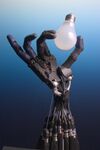Developmental robotics
 From HandWiki - Reading time: 6 min
From HandWiki - Reading time: 6 min
Developmental robotics (DevRob), sometimes called epigenetic robotics, is a scientific field which aims at studying the developmental mechanisms, architectures and constraints that allow lifelong and open-ended learning of new skills and new knowledge in embodied machines. As in human children, learning is expected to be cumulative and of progressively increasing complexity, and to result from self-exploration of the world in combination with social interaction. The typical methodological approach consists in starting from theories of human and animal development elaborated in fields such as developmental psychology, neuroscience, developmental and evolutionary biology, and linguistics, then to formalize and implement them in robots, sometimes exploring extensions or variants of them. The experimentation of those models in robots allows researchers to confront them with reality, and as a consequence, developmental robotics also provides feedback and novel hypotheses on theories of human and animal development.
Developmental robotics is related to but differs from evolutionary robotics (ER). ER uses populations of robots that evolve over time, whereas DevRob is interested in how the organization of a single robot's control system develops through experience, over time.
DevRob is also related to work done in the domains of robotics and artificial life.
Background
Can a robot learn like a child? Can it learn a variety of new skills and new knowledge unspecified at design time and in a partially unknown and changing environment? How can it discover its body and its relationships with the physical and social environment? How can its cognitive capacities continuously develop without the intervention of an engineer once it is "out of the factory"? What can it learn through natural social interactions with humans? These are the questions at the center of developmental robotics. Alan Turing, as well as a number of other pioneers of cybernetics, already formulated those questions and the general approach in 1950,[1]
but it is only since the end of the 20th century that they began to be investigated systematically.[2][3]Cite error: Closing </ref> missing for <ref> tag
However, the interaction of those mechanisms in artificial organisms, developmental robots, in particular, is still vastly understudied. The interaction of evolutionary mechanisms, unfolding morphologies and developing sensorimotor and social skills will thus be a highly stimulating topic for the future of developmental robotics.
Main journals
- IEEE Transactions on Cognitive and Developmental Systems (previously known as IEEE Transactions on Autonomous Mental Development): https://cis.ieee.org/publications/t-cognitive-and-developmental-systems
Main conferences
- International Conference on Development and Learning: http://www.cogsci.ucsd.edu/~triesch/icdl/
- Epigenetic Robotics: https://www.lucs.lu.se/epirob/
- ICDL-EpiRob: http://www.icdl-epirob.org/ (the two above joined since 2011)
- Developmental Robotics: http://cs.brynmawr.edu/DevRob05/
The NSF/DARPA funded Workshop on Development and Learning was held April 5–7, 2000 at Michigan State University. It was the first international meeting devoted to computational understanding of mental development by robots and animals. The term "by" was used since the agents are active during development.
See also
References
- ↑ Turing, A.M. (1950). "Computing machinery and intelligence". Mind (LIX) LIX (236): 433–460. doi:10.1093/mind/LIX.236.433. http://www.csee.umbc.edu/courses/471/papers/turing.pdf.
- ↑ Lungarella, M.; Metta, G.; Pfeifer, R.; Sandini, G. (2003). "Developmental robotics: a survey". Connection Science 15 (4): 151–190. doi:10.1080/09540090310001655110.
- ↑ Asada, M.; Hosoda, K.; Kuniyoshi, Y.; Ishiguro, H.; Inui, T.; Yoshikawa, Y.; Ogino, M.; Yoshida, C. (2009). "Cognitive developmental robotics: a survey". IEEE Transactions on Autonomous Mental Development 1 (1): 12–34. doi:10.1109/tamd.2009.2021702.
External links
Technical committees
- IEEE Technical Committee on Cognitive and Developmental Systems (CDSTC), previously known as IEEE Technical Committee on Autonomous Mental Development, https://cis.ieee.org/technical-committees/cognitive-and-developmental-systems-technical-committee
- IEEE Technical Committee on Cognitive Robotics, https://www.ieee-ras.org/cognitive-robotics
- IEEE Technical Committee on Robot Learning, https://www.ieee-ras.org/robot-learning/
Academic institutions and researchers in the field
- Lund University Cognitive Science - Robotics Group
- Cognitive Development Lab, University of Indiana, US
- Michigan State University – Embodied Intelligence Lab
- Inria and Ensta ParisTech FLOWERS team, France: Exploration, interaction and learning in developmental robotics
- University of Tokyo—Intelligent Systems and Informatics Lab
- Cognitive Robotics Lab of Juergen Schmidhuber at IDSIA and Technical University of Munich
- LIRA-Lab, University of Genova, Italy
- CITEC at University of Bielefeld, Germany
- Vision Lab, Psychology Department, Southern Illinois University Carbondale
- FIAS (J. Triesch lab.)
- LPP, CNRS (K. Oregan lab.)
- AI Lab, SoftBank Robotics Europe, France
- Departement of Computer Science, University of Aberdeen
- Asada Laboratory, Department of Adaptive Machine Systems, Graduate School of Engineering, Osaka University, Japan
- The University of Texas at Austin, UTCS Intelligent Robotics Lab
- Bryn Mawr College's Developmental Robotics Project: research projects by faculty and students at Swarthmore and Bryn Mawr Colleges, Philadelphia, PA, USA
- Jean Project: Information Sciences Institute of the University of Southern California
- Cognitive Robotics (including Hide and Seek) at the Naval Research Laboratory
- The Laboratory for Perceptual Robotics, University of Massachusetts Amherst Amherst, USA
- Centre for Robotics and Neural Systems, Plymouth University Plymouth, United Kingdom
- Laboratory of Computational Embodied Neuroscience, Institute of Cognitive Science and Technologies National Research Council, Rome, Italy
- Neurocybernetic team, ETIS Lab., ENSEA – University of Cergy-Pontoise – CNRS, France
- Machine Perception and Cognitive Robotics Lab, Florida Atlantic University, Boca Raton, Florida
- Adaptive Systems Group, Department of Computer Science, Humboldt University of Berlin, Germany
- Cognitive Developmental Robotics Lab (Nagai Lab), The University of Tokyo, Japan
Related large-scale projects
- RobotDoC Project (funded by European Commission)
- Italk Project (funded by European Commission)
- IM-CLeVeR Project (funded by European Commission)
- ERC Grant EXPLORERS Project (funded by European Research Council)
- RobotCub Project (funded by European Commission)
- Feelix Growing Project (funded by European Commission)
Courses
The first undergraduate courses in DevRob were offered at Bryn Mawr College and Swarthmore College in the Spring of 2003 by Douglas Blank and Lisa Meeden, respectively. The first graduate course in DevRob was offered at Iowa State University by Alexander Stoytchev in the Fall of 2005.
 |
 KSF
KSF
